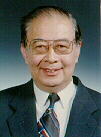

Zhang Cunhao (or, Cun-Hao Zhang) (1928- ) is a native of Wudi, Shandong Province. Zhang is a physical chemist. He graduated from Chemistry Department of Central University in 1947 and received his master's degree from University of Michigan, USA in 1950. He served as president of Dalian Institute of Chemical Physics, Chinese Academy of Sciences (CAS) from 1986 to 1990 President, National Natural Science Foundation of China from 1991 to 1999, vice president of China Association of Science and Technology from 1991, and director of Chemistry Division, CAS from 1994 to 1998. He was elected as academician of CAS in 1980 and of Third World Academy of Science (TWAS) in 1992. He was also part-time Professor of Peking University and a number of other top Chinese universities.
Zhang has engaged in the field of catalysis, chemical engineering, chemical kinetics, and frontier disciplines including combustion of propellants, chemical lasers, and chemistry of excited states. He developed in the 1950s, with his collaborators, high efficiency nitrided iron catalysts for the synthesis of liquid fuels, which won National Natural Sciences Award, Third Class. In the 1960s, as one of the leaders in research on rocket propellant and engine fuel, he and his collaborators put forward a multi-flame theory to elucidate the burning rate characteristics of solid propellants and established a related theoretical model. In the 1970s, he was engaged in chemical laser research as well as in laser spectroscopy of excited molecules. His "Hydrogen Fluoride Chemical Laser", which was the first supersonic-speed laser in dissemination model in China, won Significant Science and Technology Award, Second Class, awarded by Commission of Science Technology and Industry for National Defense in 1979. In particular, he and his collaborators made significant contributions in double resonance multi-photon ionization spectroscopy, spectroscopy of ultra-short lived molecular species, quantum state specific molecular energy transfer, and novel chemical laser systems. His publication includes over 100 referred papers. He was 4 times awarded (in 1956, 1982, 1993 and 1999) the National Natural Sciences Award, five times the CAS Award for Science and Technology Progress, CAS Natural Sciences Award, First Class in 1997, State Science and Technology Progress Award, Second Class the same year and Ho Leung Ho Lee Award for Science and Technology Advancement in 2002.